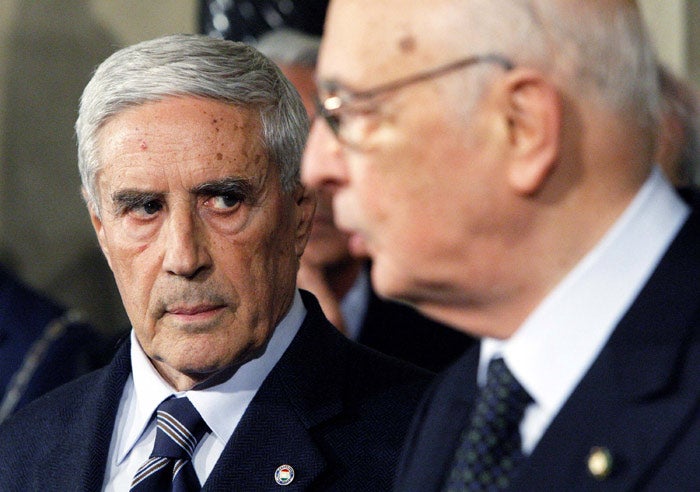Italian Speaker is asked to form government

Your support helps us to tell the story
From reproductive rights to climate change to Big Tech, The Independent is on the ground when the story is developing. Whether it's investigating the financials of Elon Musk's pro-Trump PAC or producing our latest documentary, 'The A Word', which shines a light on the American women fighting for reproductive rights, we know how important it is to parse out the facts from the messaging.
At such a critical moment in US history, we need reporters on the ground. Your donation allows us to keep sending journalists to speak to both sides of the story.
The Independent is trusted by Americans across the entire political spectrum. And unlike many other quality news outlets, we choose not to lock Americans out of our reporting and analysis with paywalls. We believe quality journalism should be available to everyone, paid for by those who can afford it.
Your support makes all the difference.In a last-ditch attempt to spare Italy an early general election, the Italian President has asked the Speaker of the Senate, Franco Marini, to see if he can muster a majority of MPs to back a government with the task of passing a new electoral law.
But there was grave scepticism about the chances of Mr Marini prevailing on the highly fragmented MPs to come together in a caretaker government, even for a limited period.
If he fails, the President, Giorgio Napolitano, is likely to have no alternative but to call early elections, expected for April at the soonest. The media magnate Silvio Berlusconi, prime minister until 2006 and now leader of the opposition, has been loudly demanding elections – and warning of popular uproar if the demand was ignored – since the fall of Romano Prodi's government last Thursday.
In an opinion poll published at the weekend, Mr Berlusconi's centre-right coalition had a lead of about 15 per cent over the centre-left led by Mr Prodi.
The choice of Mr Marini, a former union leader, to attempt the job had been widely trailed. He has run a tight ship in the often unruly Senate, barking and roaring at senators who got on his wrong side, like the right-wingers who celebrated Mr Prodi's downfall by popping champagne corks.
A left-leaning Christian Democrat before that party dissolved, he is close enough to the centre of the political spectrum to have as good a chance as anyone of luring or terrorising wavering allies of Berlusconi to take a punt on an interim government.
But political analysts were writing off his chances even before Mr Napolitano named him. An editorial in the authoritative Corriere della Sera newspaper commented: "Napolitano's initiative has the appearance of an obligatory act. A president who accepted an early close to the legislature without even trying to prevent it would be looked on with great surprise."
What was likely to prove the clinching factor was the decision of the Christian Democrat leader Pier Ferdinando Casini, an unreliable member of Mr Berlusconi's last government, to endorse the media magnate's demand for immediate elections.
Explaining his decision to try to avoid an immediate election, Mr Napolitano said: "The country and many parties demand reform. That's why my decision is neither ritualistic nor dilatory ... The crisis began after the debate on [electoral] reform had begun." An electoral reform introduced in the last months of the Berlusconi government lowered the bar for parties to enter parliament, giving undue weight to tiny parties and making effective government even harder than it is normally.
He said he had tried to encourage dialogue between parties on the left and right with a view to reaching agreement on reform – Walter Veltroni, leader of the centre-left Democratic Party and Mr Berlusconi had made tentative moves towards holding talks on a possible agreement before the crisis broke – "but that was rendered impracticable by those forces demanding immediate elections".
Last night Mr Marini's putative prime ministership was already being buried in elaborate courtesies. "I appreciate the absolute correctness of the decision of the head of state," said an ally of Mr Berlusconi in the National Alliance.
Also yesterday, Mr Berlusconi learnt that he had been found not guilty in a case of accounting fraud that has been straggling through the courts for years – because accounting fraud is no longer a crime, having been decriminalised by his last government.
Join our commenting forum
Join thought-provoking conversations, follow other Independent readers and see their replies
Comments